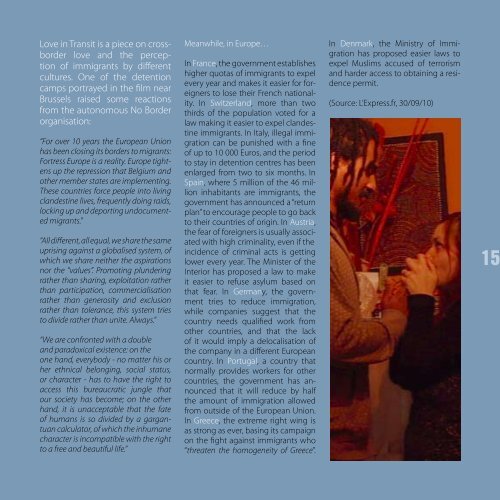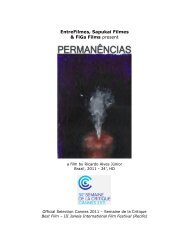ISTANBUL EXPRESS - Nisi Masa
ISTANBUL EXPRESS - Nisi Masa
ISTANBUL EXPRESS - Nisi Masa
Create successful ePaper yourself
Turn your PDF publications into a flip-book with our unique Google optimized e-Paper software.
Love in Transit is a piece on crossborder<br />
love and the perception<br />
of immigrants by different<br />
cultures. One of the detention<br />
camps portrayed in the film near<br />
Brussels raised some reactions<br />
from the autonomous No Border<br />
organisation:<br />
“For over 10 years the European Union<br />
has been closing its borders to migrants:<br />
Fortress Europe is a reality. Europe tightens<br />
up the repression that Belgium and<br />
other member states are implementing.<br />
These countries force people into living<br />
clandestine lives, frequently doing raids,<br />
locking up and deporting undocumented<br />
migrants.”<br />
“All different, all equal, we share the same<br />
uprising against a globalised system, of<br />
which we share neither the aspirations<br />
nor the “values”. Promoting plundering<br />
rather than sharing, exploitation rather<br />
than participation, commercialisation<br />
rather than generosity and exclusion<br />
rather than tolerance, this system tries<br />
to divide rather than unite. Always.”<br />
“We are confronted with a double<br />
and paradoxical existence: on the<br />
one hand, everybody - no matter his or<br />
her ethnical belonging, social status,<br />
or character - has to have the right to<br />
access this bureaucratic jungle that<br />
our society has become; on the other<br />
hand, it is unacceptable that the fate<br />
of humans is so divided by a gargantuan<br />
calculator, of which the inhumane<br />
character is incompatible with the right<br />
to a free and beautiful life.”<br />
Meanwhile, in Europe…<br />
In France, the government establishes<br />
higher quotas of immigrants to expel<br />
every year and makes it easier for foreigners<br />
to lose their French nationality.<br />
In Switzerland, more than two<br />
thirds of the population voted for a<br />
law making it easier to expel clandestine<br />
immigrants. In Italy, illegal immigration<br />
can be punished with a fine<br />
of up to 10 000 Euros, and the period<br />
to stay in detention centres has been<br />
enlarged from two to six months. In<br />
Spain, where 5 million of the 46 million<br />
inhabitants are immigrants, the<br />
government has announced a “return<br />
plan” to encourage people to go back<br />
to their countries of origin. In Austria,<br />
the fear of foreigners is usually associated<br />
with high criminality, even if the<br />
incidence of criminal acts is getting<br />
lower every year. The Minister of the<br />
Interior has proposed a law to make<br />
it easier to refuse asylum based on<br />
that fear. In Germany, the government<br />
tries to reduce immigration,<br />
while companies suggest that the<br />
country needs qualified work from<br />
other countries, and that the lack<br />
of it would imply a delocalisation of<br />
the company in a different European<br />
country. In Portugal, a country that<br />
normally provides workers for other<br />
countries, the government has announced<br />
that it will reduce by half<br />
the amount of immigration allowed<br />
from outside of the European Union.<br />
In Greece, the extreme right wing is<br />
as strong as ever, basing its campaign<br />
on the fight against immigrants who<br />
“threaten the homogeneity of Greece”.<br />
In Denmark, the Ministry of Immigration<br />
has proposed easier laws to<br />
expel Muslims accused of terrorism<br />
and harder access to obtaining a residence<br />
permit.<br />
(Source: L’Express.fr, 30/09/10)<br />
15





